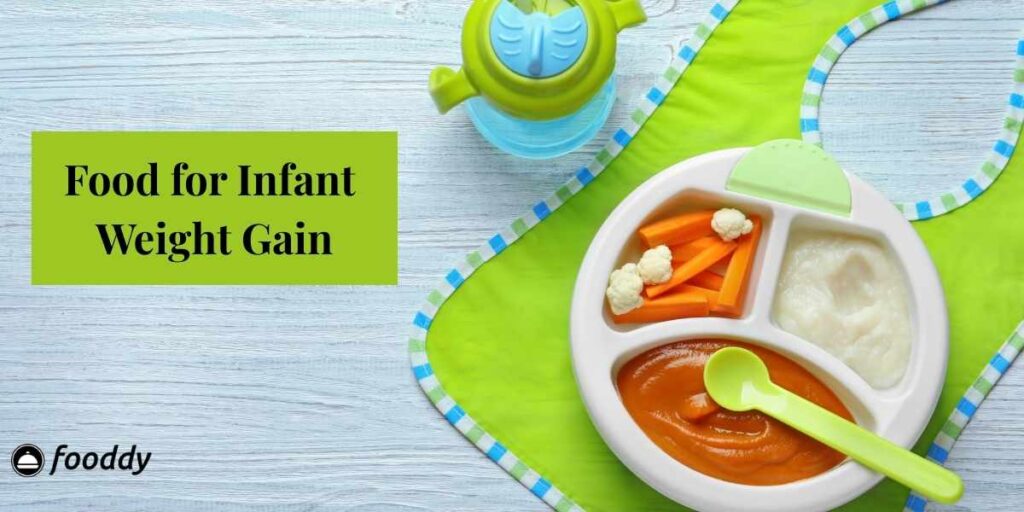Weight gain in infants is one of the most carefully observed and widely discussed aspects of early childhood growth. Although every baby has a unique pace of development, it is natural for parents to worry when their little one seems smaller than expected or shows slower progress on the growth chart. While inherited traits and individual growth patterns certainly play a role, proper nutrition is the cornerstone of healthy weight gain and overall development. This guide is designed to walk you through the basics of infant weight gain, highlight effective food choices for steady progress, and offer insights on when professional guidance from a pediatrician may be necessary to ensure your baby is thriving.
In the first months of life, a baby’s body is growing at an extraordinary rate—muscles are strengthening, bones are forming, organs are maturing, and the brain is developing rapidly. At this stage, providing the right nourishment is especially critical, particularly when the child transitions from breastmilk or formula to semi-solids and eventually to solid foods. Parents often wonder which foods can best support healthy growth without overwhelming the baby’s delicate digestive system.
Understanding Infant Weight Gain
Healthy weight gain in infants is more than just an increase in fat; it reflects a well-rounded growth process that nurtures the body as well as the brain. During the first year, babies typically grow at an impressive rate, with most doubling their birth weight by around five months and tripling it by their first birthday. These figures, however, are only general milestones and should not be viewed as strict guidelines. Every child follows their own individual growth curve, which may be influenced by genetic makeup, feeding practices, metabolism, and even their daily activity levels. Some infants may gain weight rapidly while others progress more steadily, and in most cases, both patterns can be completely normal. What truly matters is consistent progress and a healthy balance between physical and cognitive development rather than simply focusing on the numbers on the scale.
There are two important phases when it comes to healthy infant weight gain:
0–6 Months:
During the first six months, breast milk or infant formula is the sole source of nourishment, providing all the proteins, fats, vitamins, and minerals a baby needs for growth. At this stage, weight gain is almost entirely dependent on milk intake. Regular feeding ensures steady progress, and frequent nursing or formula feeding every few hours helps meet the baby’s rapid calorie requirements. Parents should focus on recognizing hunger cues rather than trying to follow rigid schedules, as every child’s appetite differs.
Also Read – Best Formula Milk for Newborn
6–12 Months:
From six months onward, babies gradually begin their journey into solid foods while continuing breast milk or formula. This is a critical period where complementary, nutrient-rich food like mashed fruits, pureed vegetables, lentils, cereals, and healthy fats can support both weight gain and overall development. Along with solids, milk remains a vital component of the diet, ensuring the baby’s nutritional needs are met during this transitional stage. Offering a variety of high-calorie but wholesome options helps promote healthy growth without overburdening digestion.
It’s also essential to remember that weight alone is not the full picture of a baby’s health. A thriving infant should also be alert, active, and steadily reaching their developmental milestones. Growth should ideally be monitored with standard growth charts while maintaining regular check-ups with a pediatrician to track progress and address any concerns early.
Best Food for Infant Weight Gain (Top 10 Foods)
Introducing solid foods is an important milestone for infants, and choosing the right nutrient-dense options can help support healthy weight gain and overall growth. Around the age of six months, when babies begin to transition from milk to solids, incorporating a variety of wholesome foods packed with calories, healthy fats, proteins, and essential vitamins is key.
Below is a list of ten of the best foods that are known to encourage steady, healthy weight gain in infants while providing balanced nutrition for their developing bodies and minds.
Bananas
Bananas are an ideal first fruit for babies because they are naturally sweet and provide a good amount of calories and sugars, giving quick energy. Their soft texture makes them easy to mash and gentle on tiny tummies.
Full-Fat Yogurt
Full-fat yogurt offers healthy fats and plenty of calcium needed for strong bones. It also contains beneficial probiotics that help support your baby’s digestion. Many babies love its smooth, creamy feel and mild taste.
Avocados
Avocados are creamy, delicious, and loaded with healthy fats that support brain and body development. They’re easy to mash and perfect for babies just starting solids, helping them gain weight in a nutritious way.
Potatoes and Sweet Potatoes
Comforting and gentle on tiny stomachs, potatoes and sweet potatoes are rich in carbohydrates and fiber. These veggies provide lasting energy and can be prepared simply by mashing or pureeing.
Egg Yolks
Egg yolks are full of good fats, proteins, and vitamins which support healthy growth. Be sure to cook them thoroughly, and it’s best to wait until after the first year to introduce egg whites because of allergy concerns.
Ghee (Clarified Butter)
Adding a little ghee to your baby’s meal, like mashed veggies or rice, is a great way to boost calories naturally. It’s rich in healthy fats and has been a trusted ingredient in many traditional diets.
Nut Powders (Almond/Cashew)
Once you’re sure your baby isn’t allergic, finely ground nut powders can be stirred into porridges or purees. They add healthy fats and protein to meals, giving a nutritional boost without overwhelming little tummies.
Cheese
Soft cheeses such as paneer or cream cheese provide a good source of calcium and fats. Serve in small amounts, either as soft finger foods or mixed into other dishes for extra nourishment.
Ragi (Finger Millet)
Ragi is a healthy millet packed with calcium, iron, and fiber. Preparing it as a porridge with milk or ghee creates a nourishing and satisfying meal that aids in healthy weight gain.
Oats
Oats provide slow-releasing carbohydrates and fiber, making them an excellent energy source. Combining oats with fruit or nut butter offers a delicious and nutritious option for your baby’s meals or snacks.
These foods can be easily turned into purees, porridges, or soft finger foods to support your baby’s steady and healthy growth.
Homemade Food for Infant Weight Gain
Although store-bought baby foods are handy and easy to use, preparing meals at home gives you greater control over the ingredients and ensures freshness. Homemade options also allow you to tailor textures and flavors to your baby’s preferences and nutritional needs.
Below are some wholesome homemade food ideas that can effectively support healthy weight gain in infants, providing essential nutrients in a way that’s both tasty and gentle on little tummies.
Ragi Banana Porridge
Cook ragi flour in either water or milk until soft, then stir in mashed banana and a teaspoon of ghee. This porridge is not only filling but also packed with essential nutrients, making it a great meal for weight gain.
Khichdi with Ghee
A simple, comforting dish made from rice and moong dal cooked with a variety of vegetables and finished with a drizzle of ghee. This balanced meal provides carbohydrates, protein, vitamins, and healthy fats, perfect for growing infants.
Suji Halwa (Semolina Porridge)
Prepare semolina with water or milk, adding ghee and fruit puree for sweetness and richness. This dish offers good calories and healthy fats in a smooth, easy-to-eat consistency.
Mashed Potato and Carrot Mix
Steam potatoes and carrots until tender, then mash them together with a little butter for a creamy, nutrient-rich mash that’s gentle on tiny digestive systems.
Oats and Apple Porridge
Combine oats with grated apple and cook until soft. Adding a pinch of cinnamon can introduce a mild, pleasant flavor while enhancing the meal’s nutritional value.
Moong Dal Soup
A light, protein-packed soup made from yellow moong dal that is easy to digest. Blend it for younger babies or keep it chunkier for older infants learning to chew.
Mashed Egg Yolk and Breastmilk Formula
Boiled egg yolk mashed and mixed with breastmilk or formula creates a soft and nourishing food choice rich in fats and proteins.
Rice Cereal with Nut Powder
Homemade rice cereal fortified with finely ground almond or cashew powder increases calorie density and adds healthy fats crucial for weight gain.
Idli with Ghee
Soft, steamed idlis can be mashed and combined with ghee or lentil-based sambhar to add flavor, fats, and proteins, making it a wholesome meal option.
Paneer Crumble with Vegetables
Homemade paneer crumbled into boiled vegetables creates a soft, protein-rich dish that supports muscle growth and helps infants gain weight healthily.
Making these meals at home ensures better control over hygiene and freshness while allowing customization according to your baby’s taste preferences and digestion needs.
When to Consult a Pediatrician?
Although each baby grows at their own unique pace, there are certain warning signs that suggest it’s time to seek medical advice from a pediatrician:
- If your baby shows no weight gain for more than two to three weeks after birth, it’s important to have them evaluated.
- A sudden or sharp drop in weight percentile on the growth chart can indicate potential health or nutritional issues.
- Signs such as lethargy, low energy levels, or consistently poor feeding habits need to be taken seriously.
- Frequent vomiting or diarrhea following feedings may point to digestive problems or food sensitivities requiring medical attention.
- If your infant refuses to eat solid foods beyond the typical starting age of eight to nine months, it could be a sign of underlying concerns.
Watch for symptoms of food allergies, including skin rashes, swelling, or unusual stools, which should be promptly addressed.
Your pediatrician might recommend specific dietary changes, supplements, or run tests to identify conditions like lactose intolerance, anemia, or gastrointestinal disorders.
Conclusion for Food for Infant Weight Gain
Weight gain in infants is a complex process influenced by multiple factors including genetics, feeding patterns, physical activity, and overall health. While some babies may gain weight more slowly without it being a serious issue, providing a well-balanced and nourishing diet remains crucial for their healthy growth and development.
Introducing nutrient-dense and calorie-rich foods at the right stages can greatly support your baby’s progress. Foods such as bananas, avocados, sweet potatoes, ghee, and full-fat yogurt are excellent choices that complement continued breastfeeding or formula feeding throughout the first year. Preparing homemade meals adds freshness, variety, and greater control over what your little one consumes.
Above all, paying close attention to your baby’s hunger signals, maintaining consistent feeding routines, and consulting healthcare professionals when necessary will help ensure your infant stays on a positive growth trajectory. A content, energetic, and steadily growing baby is the best indicator of a healthy start in life.
FAQs Food for Infant Weight Gain
Q1. At what age can I start solids for my baby’s weight gain, and which food for infant weight gain is best to begin with?
Ans:- You can begin introducing solid foods around 6 months, following your pediatrician’s advice.
Q2. Is ghee safe for babies?
Ans:- Yes, adding a small amount of ghee to food after 6 months can support weight gain and aid digestion.
Q3. Can I give my baby bananas daily?
Ans:- Yes, bananas are safe and beneficial for daily feeding because of their calories and nutrients.
Q4. What’s the best time to feed high-calorie foods?
Ans:- Breakfast and lunch are the best times to offer energy-rich foods when babies are usually more active.
Q5. Can underweight babies catch up in growth?
Ans:- Yes, with proper nutrition and care, babies can reach healthy weight milestones over time.
Q6. Is cow’s milk good for weight gain in infants?
Ans:- No, cow’s milk should not be given before 1 year as it lacks essential nutrients for infants.
Q7. Can I use formula only for weight gain?
Ans:- Formula is recommended when breastmilk is insufficient or on a doctor’s advice—not just for weight gain.
Q8. What if my baby refuses to eat solid food?
Ans:- Introduce new textures and flavors gradually. If refusal persists, consult your pediatrician.
Q9. Do all babies gain weight at the same rate?
Ans:- No, weight gain varies depending on genetics, metabolism, and feeding habits. Every baby is different.
Q10. How often should I check my baby’s weight?
Ans:- Monthly weight checks are usually enough unless your doctor suggests otherwise.







